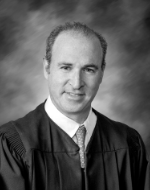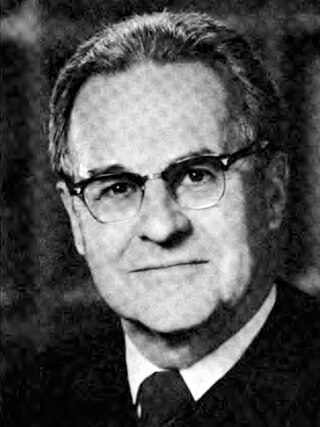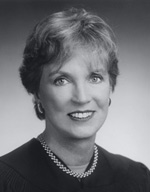
The Supreme Court of California is the highest and final court of appeals in the courts of the U.S. state of California. It is headquartered in San Francisco at the Earl Warren Building, but it regularly holds sessions in Los Angeles and Sacramento. Its decisions are binding on all other California state courts. Since 1850, the court has issued many influential decisions in a variety of areas including torts, property, civil and constitutional rights, and criminal law.

Roger John Traynor was the 23rd Chief Justice of California (1964–1970) and an associate justice of the Supreme Court of California from 1940 to 1964. Previously, he had served as a Deputy Attorney General of California under Earl Warren, and an Acting Dean and Professor of UC Berkeley School of Law. He is widely considered to be one of the most creative and influential judges and legal scholars of his time.

The California Courts of Appeal are the state intermediate appellate courts in the U.S. state of California. The state is geographically divided along county lines into six appellate districts. The Courts of Appeal form the largest state-level intermediate appellate court system in the United States, with 106 justices.

Mathew Oscar Tobriner was an American lawyer and law professor who served as an associate justice of the California Supreme Court from 1962 to 1982.

Carol Ann Corrigan is an associate justice of the California Supreme Court. She is a former prosecutor.

Joshua Paul Groban is an American lawyer who serves as an associate justice of the California Supreme Court. He was appointed to the California Supreme Court by Governor Jerry Brown on November 14, 2018.

Ming William Chin is an American attorney and former Associate Justice of the Supreme Court of California, serving from March 1, 1996 to August 31, 2020.

Marvin Ray Baxter is a former Associate Justice of the Supreme Court of California who served from January 1991 to January 5, 2015.
In re Marriage Cases, 43 Cal. 4th 757 was a California Supreme Court case where the court held that laws treating classes of persons differently based on sexual orientation should be subject to strict judicial scrutiny, and that an existing statute and initiative measure limiting marriage to opposite-sex couples violate the rights of same-sex couples under the California Constitution and may not be used to preclude them from marrying.
Joseph Raymond Grodin is a lawyer, law professor, and a former Presiding Justice of the California Court of Appeal and an associate justice of the Supreme Court of California. Grodin lost his Supreme Court seat in a contentious 1986 retention election that also removed Justice Cruz Reynoso and Chief Justice Rose Bird.
Intel Corp. v. Hamidi, 30 Cal. 4th 1342 (2003), is a decision of the California Supreme Court, authored by Associate Justice Kathryn Werdegar. In Hamidi the California Supreme Court held that a former Intel Corporation employee's e-mails to current Intel employees, despite requests by Intel to stop sending messages, did not constitute trespass of Intel's e-mail system.
North Coast Women's Care Medical Group, Inc. v. San Diego County Superior Court is a case decided before the California Supreme Court on August 18, 2008, ruling that physicians must offer IUI infertility services to gays and lesbians despite religious objections or find a colleague in their office who will do so.

Janice Rogers Brown is an American jurist. She served as a United States circuit judge of the United States Court of Appeals for the District of Columbia Circuit from 2005 to 2017 and before that, Associate Justice of the California Supreme Court from 1996 to 2005. She is a member of the Federalist Society and frequently features at events hosted by the organization.

Frank Kellogg Richardson was an American attorney and Associate Justice of the California Supreme Court.
Otto Michael Kaus was an Austrian-born lawyer and judge from the State of California.
Edward Alexander Panelli is a former Associate Justice of the Supreme Court of California who served from December 24, 1985, to May 3, 1994.
The Judiciary of California or the Judicial Branch of California is defined under the California Constitution as holding the judicial power of the state of California which is vested in the Supreme Court, the Courts of Appeal and the Superior Courts. The judiciary has a hierarchical structure with the California Supreme Court at the top, California Courts of Appeal as the primary appellate courts, and the California Superior Courts as the primary trial courts.
Benjamin Rey Schauer was an American attorney and Associate Justice of the Supreme Court of California from December 18, 1942, to September 15, 1965.
The People of the State of California v. Superior Court (Decker), 41 Cal. 4th 1 (2007), is a criminal case decided by the Supreme Court of California that distinguished between solicitation and attempt.
Bristol-Myers Squibb Co. v. Superior Court of California, San Francisco County, 582 U.S. ___ (2017), was a United States Supreme Court case in which the Court held that California courts lacked personal jurisdiction over the defendant on claims brought by plaintiffs who are not California residents and did not suffer their alleged injury in California. It is part of a group of six cases decided since 2011 that have greatly changed the application of personal jurisdiction.










